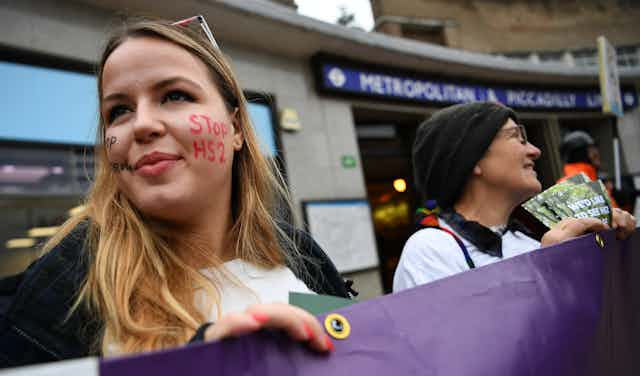The British government is expected to reaffirm its commitment to building HS2, the proposed high-speed rail network, despite substantial opposition from sections of the public, politicians and environmental groups. For example, a recent report commissioned and published by The Wildlife Trusts drew attention to the habitat loss threatened by HS2. The report claims as many as 693 classified wildlife sites within 500 metres of the line will be impacted, something echoed by Extinction Rebellion and Stop HS2 activists:
Using guile, deceit, lies, fraud, coercion, blackmail and immensely destructive practices, HS2 wish to put an end to all we hold dear and our most important legacy to our children. This is our rainforest. Right now we desperately need tree climbers. We desperately need people. People really scare HS2.
This emotive language, playing to historic fears of destruction, pits HS2 against conservation. The pressure from environmental groups adds to that from those politicians who want the government to cancel or alter the project in favour of schemes that provide more benefit to their local areas. As a result, the future of the scheme has been uncertain, even with government backing.
Yet, like many projects with importance for wildlife, HS2 is by no means a clear-cut choice between obliteration and preservation. The problem is that human politics is central in defining the outcome of such planned projects and scientific knowledge is too often displaced by binary thinking.
The purpose of HS2 is partly to provide faster rail services between London, Birmingham, Manchester and Leeds (and, in turn, to other follow-on destinations). But it will also increase capacity on existing rail routes by taking current fast intercity trains off those lines, making space for more local commuter and freight services.
Research by the transport development organisation Midlands Connect found that as many as 73 stations would benefit from increased rail capacity, 54 of which are not directly served by the new lines. In short, HS2 will streamline a large proportion of the UK’s rail network.

The provision of frequent, accessible and attractive public transport is needed to encourage a “modal shift” away from the country’s reliance on CO₂-producing cars, lorries and planes. HS2 offers the UK a major opportunity to follow the examples demonstrated elsewhere in Europe and Asia. High-speed rail has reduced air travel’s modal share everywhere it has been introduced and can also reduce car use, especially over long distances, helping to create a new vision for long-distance travel.
Without this kind of change, we face runaway climate change and a significant threat to exactly the biodiversity that environmental groups want to protect – and not just in the area around HS2’s tracks. Research has shown how overall biodiversity can benefit even from measures to address climate change that might damage it on a small scale.
Yet the research is too often overlooked when political debates descend into simplistic narratives of development versus destruction, preservation versus loss. The picture is always more complex.
Badger culling
HS2 is not an isolated example of politics taking precedence over evidence. Take, for instance, the UK government’s current strategy for eradicating bovine tuberculosis, which involves the culling of infected cattle and, in some regions, other species that can spread the disease, such as badgers.
The government describes this approach as “science-led”. Yet as with HS2, the whole picture is complex and coloured by politics. While culling might seem a good solution, and is popular with practitioners, it is only fair to say that the scientific evidence shows a mixed picture.
Many environmental activists argue that the limited evidence for culling means the animals suffer needlessly. On the other hand, in some places the culling of badgers can have a positive impact on species they prey on, such as hedgehogs.
As for cattle, the government itself recognises that the risks of people catching TB from milk or meat from infected cows are extremely low. But because of restrictions in other countries, bovine TB impacts the UK’s ability to sell its produce abroad, which is increasingly important following Brexit and the opening of new trade negotiations around the world.
In a climate where politicians and commentators polarise the debate, members of the public can find it understandably difficult to judge the worth of various policies that impact wildlife. And the rejection of expert and practitioner knowledge also makes it difficult for policy-makers to make pragmatic judgements.
What we actually need is more, not less, scientific knowledge. Politicians, activists, journalists and the general public need to take a closer look at the empirical and scientific evidence to make a balanced judgement when evaluating difficult ecological problems that arise in the wake of infrastructure planning. Now more than ever, we need to move beyond human politics to investigate the facts that support sustainable policy decisions.

